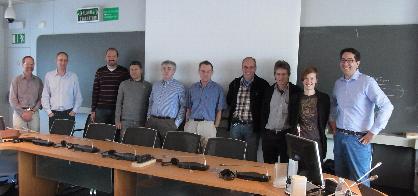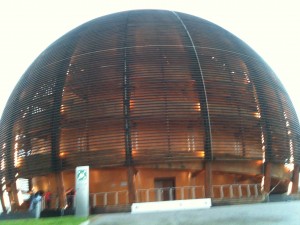I was last week listening to a speech by Jocelyn Bell Burnell in the Globe at CERN. She was telling
about the situation of women in the STEM (=science, technology, engineering & maths) fields. Currently, women are much underrepresented in these fields, especially at the higher level, and alarmingly the gender gap does not show signs of getting smaller. The examples Prof. Burnell told from her study times (>40 years ago) could have been from my studies (<10 years ago): during the four first years of studying physics at the university I didn’t have a single lecture given by a female professor. The data presented was mainly from the academia, since the private sector doesn’t keep statistics, but I doubt that the situation would be much different.
One thing especially struck me in Prof. Burnell’s speech: It is not the women’s fault, that the situation is skewed. There is no proof that they would be less competent, less capable or less interested in doing science/technology related jobs, even though our unconscious bias often tells us so [1]. Actually, almost 50% of men also disappear from science. There is something wrong in the career
path in science, and the minorities (women, foreigners etc.) struggle more with these obstacles than men, who are more often helped over the hurdles by peer-support or mentors. Science is currently structured so that only very few make it to the top, and the others need to find something else to do. But do we therefore get on the higher levels only those with the sharpest elbows, instead of the best scientists? My colleague is afraid she can’t make a successful career in science, because she is too nice. Help – hands up those who don’t want to have a skilled, hard-working AND nice colleague! Do we afford to loose these people to other fields?
Why do we want to have more women in the science and technology field? First of all, we have invested in their education. Not being able to use one’s education is a huge economical loss for the society and for the individual. Secondly, diversity on work-places increases well-being and creativity, both of which are needed for making innovations. Different people look the world from different angles. Would our perspective on the universe be different, if women would have had equal opportunities in discovering it (J.B. Burnell herself is famous for discovering pulsar stars and NOT getting a Nobel prize for it)? Would the technologies we use every day be different, if more women had taken part in designing them?
PS. 33% of Airmodus employees are female physicists!
[1] Moss-Racusin et al.: Science faculty’s subtle gender biases favor male students. Proc. Nat. Acad. Sci. 2012
The lecture was organized by the CERN diversity program.

The CLOUD project has attracted brilliant female students (now even a majority). But look at the portrait of the PIs! (Blogger got into the picture as the actual PI’s flight was delayed). Photo: K. Ivanova

